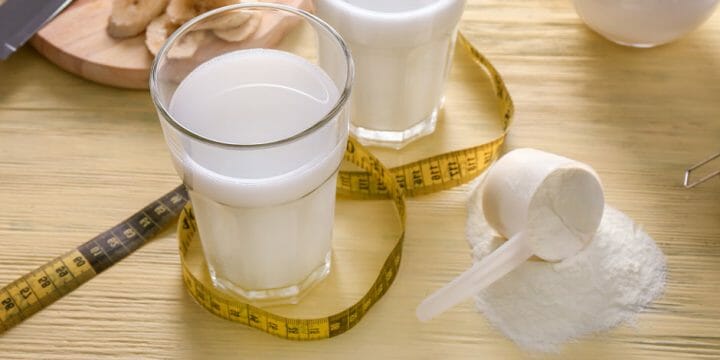You’ll gain muscle faster if you consume more protein — but should you really drink whey protein every day?
We spent hours examining studies and consulting with a dietitian to find the answer.
Here’s what you need to know about the possible side effects of too much whey and how to prevent them.
Quick Summary
- You can drive whey protein every day if you are not getting sufficient amounts of protein from food.
- Scientifically, the recommended daily dose of protein is 0.36 grams per pound of body weight.
- Whey protein is healthy as it contains all the essential 9 amino acids, which you might not get solely from your diet.
-
Moderate protein consumption doesn't harm healthy kidneys, debunking the myth of kidney damage due to high protein intake. In my opinion, only those with a predisposed condition might face kidney issues from high protein, while healthy kidneys remain unaffected.
Can You Drink Whey Protein Every Day?

You can drink whey protein every day if you’re not already getting enough protein from food.
Here's the scoop on whey protein:
Most adults need about 0.36 grams of protein per pound of body weight. That's roughly 0.8 grams per kilo [1]. But if you're hitting the gym hard and aiming for those gains, you might want to up that to 0.9-1g per pound or 2g per kilo.
Quick math time: Say you weigh 170 pounds. That's 61 grams of protein daily for the average Joe (170 x 0.36 = 61.2). But if you're in beast mode? You're looking at 170 grams (170 x 1 = 170).
Now, stack that against the protein you're munching from your meals.
Chances are, you're not overdoing it. So, feel free to whip up a protein shake daily. No sweat.
Though many folks suggest 1-2 scoops (that's 25-50 grams) of whey protein daily [2], remember, it's not one-size-fits-all. Tailor it to your weight and diet. Don't just go with the flow.
Is Whey Protein Healthy?
From my own experience, whey protein powder has been a game-changer. It not only equips your body with all nine essential amino acids but also fills in the gaps that sometimes our regular diet misses.
Amino acids are good for all sorts of things — muscle gain being one of them. They encourage muscle protein synthesis, which helps in building muscle faster.
However, the safety of any protein powder depends on the manufacturers.
Here’s the thing: the FDA leaves it up to the manufacturers to evaluate the safety of their products and even label them.
So, it’s always possible that a powder contains some harmful ingredients that aren’t declared in the Nutrition Facts.
That’s why we recommend you choose a whey protein powder that’s been tested by an unbiased third party, such as ConsumerLab and USP. Their tests are more credible than those conducted by the manufacturers themselves.
Side Effects: Myths or Facts?

Let’s explore three side effects that are often linked to whey protein. We’ll try to examine whether they’re myths or facts by looking at the results of scientific studies on this supplement.
Kidney Damage
High protein intake can cause kidney damage, but only if you have a predisposed condition.
In that case, your kidneys may struggle to flush out excess protein, and this may lead to dehydration.
Otherwise, numerous studies have shown that moderate consumption of protein doesn’t affect healthy kidneys [3].
So, you should only avoid whey if you already have kidney issues. And, of course, you should avoid exceeding your recommended protein intake.
The verdict: A myth, unless you already have kidney issues.
Weight Gain

However, some whey protein powders contain a lot of added sugar and have a high-calorie count.
Such products may cause you to put on a few extra pounds and increase your blood sugar, especially if you drink a protein shake every day.
But even if you use a powder with zero sugar, you might still gain weight if you consume it in high amounts [4]:
“Excess protein intake can lead to weight gain as the surplus protein in the body is stored as fat as it has nowhere else to go.”
- Lina Velikova, MD, Ph.D., Clinical Immunologist, Gastroenterologist, & medical advisor
Again, taking protein supplements in moderation seems to be the key to preventing weight gain and promoting weight loss.
The verdict: A myth, unless you consume whey protein in excess.
Related: Best Protein Powders For Weight Loss
Liver Health
Science hasn’t linked whey protein powder to liver damage in people who exercise.
But one study showed that whey could hurt the liver when taken without working out [5].
When you don’t exercise, the protein from the supplement goes to the liver for processing instead of being used to build muscle. This can lead to liver injury.
So, if you want to avoid liver damage, you’ll have to combine your protein shakes with enough physical activity.
The verdict: Myth, unless you use whey without exercising
3 Common Mistakes To Avoid

I've been drinking whey daily for years, and trust me, it's easy to slip up. Here are three common mistakes I've learned to avoid to ensure I'm reaping the benefits without the drawbacks.
Don’t Swap Meals For Shakes
Protein supplements can never replace protein-rich foods. You should still consume a nutritious diet even if you’re taking a whey protein supplement every day.
You can get protein from foods such as:
- Lean meats (beef, lamb, veal, etc.)
- Poultry (chicken, turkey, goose, etc.)
- Dairy products (milk, yogurt, cheese, etc.)
- Fish and seafood (fish, crab, lobster, etc.)
- Eggs
Don’t Use Whey Concentrate
Whey concentrate undergoes less processing than whey isolate. That’s why isolate is a bit more expensive but much healthier — it has fewer carbs and less fat and lactose than concentrate [6].
To ensure you’re using a healthy protein supplement, opt for whey protein isolate instead of concentrate.
Don’t Ignore Nutrition Facts

Some protein powders contain a lot of added sugar, artificial ingredients, and common allergens.
Also, whey is based on dairy, so people who are lactose intolerant or sensitive to dairy should avoid it.
Unfortunately, most people don’t bother reading the Nutrition Facts, so they don’t know what they’re putting into their bodies.
They might experience side effects as a result. If you want to avoid them, make sure to check the label before buying whey.
Differences Between Various Protein Sources
Having experimented with different protein sources like whey, casein, and soy, I've noticed they each have unique effects on muscle protein synthesis, all thanks to their composition and digestion rates.
- Whey Protein: Whey is rapidly absorbed, making it an excellent choice for post-workout nutrition. Its high leucine content quickly stimulates muscle protein synthesis, facilitating muscle repair and growth. Whey also contains essential amino acids, enhancing its effectiveness.
- Casein Protein: Casein, on the other hand, digests slowly, providing a sustained release of amino acids. This steady supply can support muscle protein synthesis over an extended period, such as during sleep. It prevents muscle breakdown and promotes an anabolic state.
- Soy Protein: Soy protein is a plant-based option, rich in essential amino acids. While it may not stimulate muscle protein synthesis as robustly as whey, it is still effective for muscle repair and growth, making it a valuable choice for vegetarians and vegans.
FAQs
Is It Ok to Drink Whey Protein Without Working Out?
Drinking whey protein shakes without working out may damage your liver in the long run, so we wouldn’t recommend it.
What Are the Symptoms of Too Much Protein?
Too much protein may cause nausea, irritability, dehydration, headache, diarrhea, and digestion issues.
Does Protein Make Your Skin Glow?
In a sense, yes - protein does make your skin glow. Protein is one of the main building blocks of skin tissue, so it’s vital for healthy and plump skin.
References:
- https://www.health.harvard.edu/blog/how-much-protein-do-you-need-every-day-201506188096
- https://www.healthline.com/nutrition/whey-protein-101
- https://pubmed.ncbi.nlm.nih.gov/21102327/
- https://www.eatthis.com/protein-powder-dangers-every-day/
- https://pubmed.ncbi.nlm.nih.gov/32702243/
- https://www.healthline.com/nutrition/whey-protein-isolate-vs-concentrate
About The Author
You May Also Like






